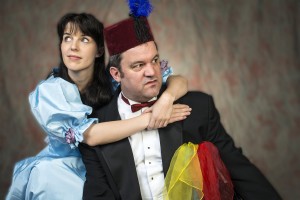
Credit: Doug Williams
At Jericho Arts Centre until April 21
604-224-8007/unitedplayers.com
Posted on March 31, 2013
Oh, Mr. Gill, what have they done to you? First they give you a hunchback, then they put you in tight, tartan knickers and a button-popping vest, and finally – the coup de grâce – they make you speak in rhyming couplets for two hours. Good grief.
James Gill, a United Players veteran and subscribers favourite, portrays Scotty Scott in British playwright Tony Harrison’s adaptation of Le roi s’amuse. Written by Victor Hugo in 1832, Le roi s’amuse was viciously anti-monarchical and so incensed King Louis-Phillipe that the production was shut down after opening night in Paris. Hugo received this message from the stage manager shortly after the curtain fell at the Comédie-Francaise: “It is half-past ten, and I have just received the order to suspend the performance of Le roi s’amuse.” Hugo apparently wandered home down the Seine rather happy about the whole thing; overnight he became the poster boy for free speech in France and a national hero.
Guiseppe Verdi took up the tale in 1851 with his triumphant Rigoletto. And in 1996, Tony Harrison versified it. Hugo’s hunchback was Triboulet; Verdi called him Rigoletto; Harrison makes him Scotty Scott.
Why this play? Why now?
The story exposes, in Harrison’s remake for the Royal National Theatre, a licentious, Victoria-era Prince of Wales who, were his belt notched for every virgin he deflowered, every husband he cuckolded and every wife he seduced, it would be nothing but notches. In the Prince’s employ as the court clown and procurer of women to satisfy His Royal Highness’s insatiable lust is Scotty Scott, a mildly deformed hunchback. What neither the Prince of Wales nor his courtiers know is that Scott has a beautiful, sixteen-year-old daughter hidden away – imprisoned, really – to keep her safe from the Prince’s advances. Scott’s cloistering of his daughter borders on latent incestuous desire so his motives are suspect.
Becky, for so she is called, is like Shakespeare’s Juliet: eager for love but in an innocent, unknowing way.
The Prince’s Play feels very like a Jacobean revenge tragedy in the style of Thomas Kyd, John Webster and John Ford. The courtiers are all in on the Prince’s sexploitations; indeed, they are all pimping for him as they arrange for each other’s wives and daughters to warm the royal bed. Act 2 is all about the folly of revenge.
In spite of Tony Harrison’s celebrity and success as a poet-playwright, I don’t think the rhyming couplets work here for several reasons. Firstly, it’s distracting to find yourself rushing ahead to imagine what rhymes he’ll come up with. (I did like this one, however: “Weep at our tragedy/Laugh at our farce/But all mobile phones/Will get rammed up your arse” – or something like that. Not sure if that was in the script or a United Players add-on. Either way, you get the idea.) Secondly, there are not many actors – professional or, as here, mostly non-professional – who can deliver rhyming couplets without sounding as if they’re spouting Dr. Seuss. Harrison also drops in, amongst the Victorian era language, some contemporary words and phrases that are jarring: “I don’t want to die/I’ve better things to do” or, referring to what the courtiers believe is Scott’s Cheapside mistress, “a pleb living in a cul-de-sac.” No amount of contemporizing the language makes this play relevant.
As Scotty Scott, Gill does his damndest. It’s a huge role and a very conflicted one: loving father, hypocrite, pimp, toady – he’s all of these. And he approaches the work with his customary commitment. There are, here and there, even times when we really feel for Scotty Scott.
Stephanie Dyck is sweetly blushing and girlish as Becky and Helen Martin is wicked as bribe-taking Mrs. Bryden and bawdy as Magdalena, sister of The Diddicoy (a gypsy-like cutthroat), given a nicely-controlled performance by John Prowse who manages to make the couplets sound like conversation.
Edward Foy is the swashbuckling but dissolute Prince who does, very briefly, makes us consider that little Becky might just possibly reform him. Others in the cast are Sean Allan, David Wallace, Shannon Christopher Wright and John Harris.
Todd Parker’s set is appropriately shadowy with its gibbets/lamp standards but requires a fair bit of shuffling around; the set adjustments, however, are nicely enhanced by violinist Genevieve Mackay who also plays Lady Gossett and The Equerry.
Reviews of the original production are scant. Paul Taylor of The Independent termed it “trenchant” in his April 22, 1996 review but independent critic Darren Dalglish summed it up like this: “Even if the plot had been interesting and relevant, the script needed an axe taking [sic] to it.”
Often dubbed The Little Theatre That Could, United Players is not afraid of taking risks. Directed by C.W. Marshall, this is a big one.

